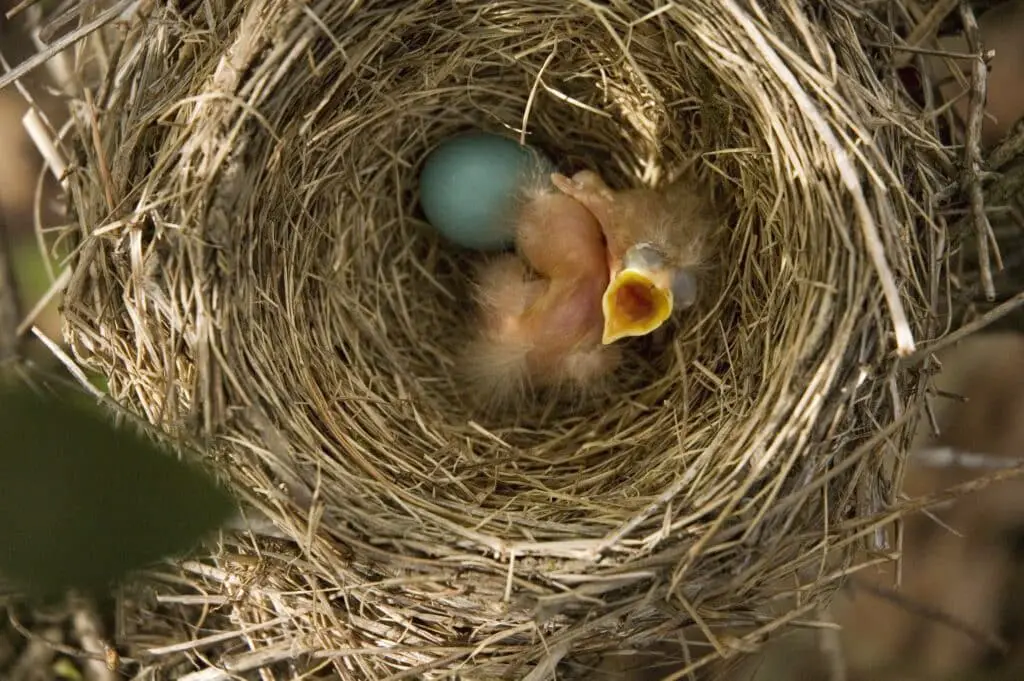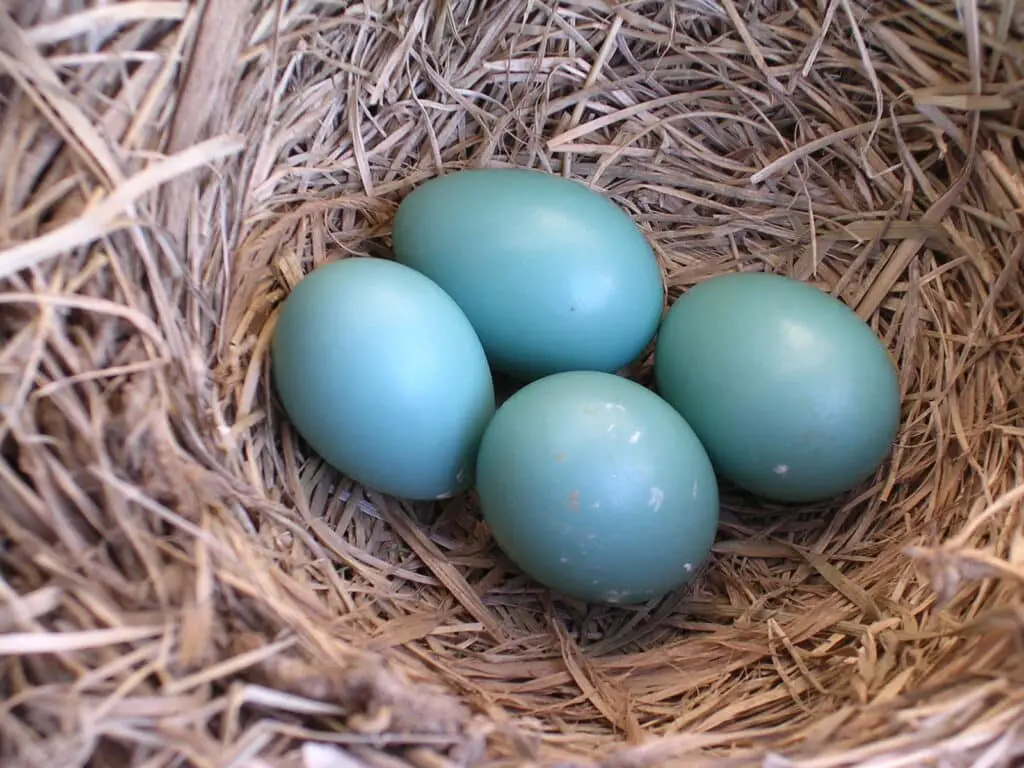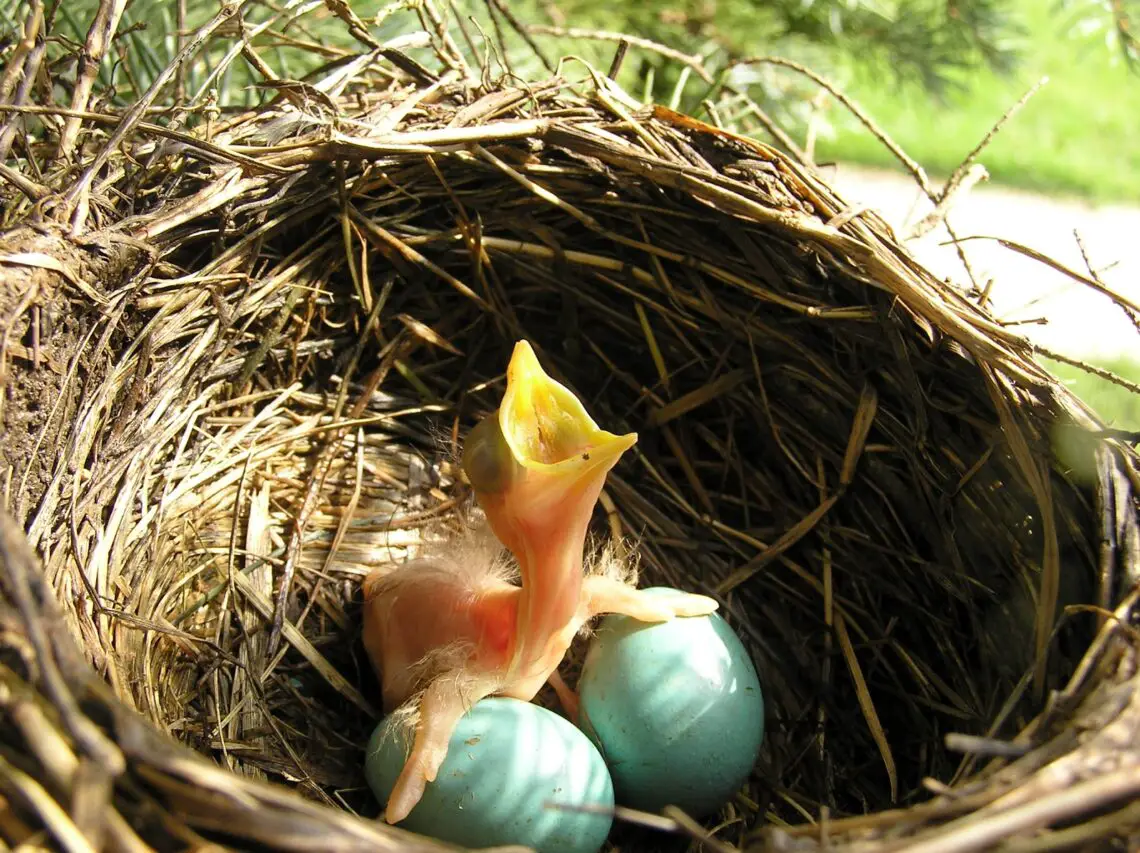Introduction
How Long Do Baby Robins Stay In The Nest: The journey of a robin’s life begins in a nest, and the duration of their stay there is a critical phase in their development. Understanding how long baby robins remain in the nest sheds light on their growth, parental care, and the fascinating world of avian life. This pivotal period encompasses the transition from helpless hatchlings to fledglings ready to explore the world beyond the nest. Let’s delve into the intricacies of this process to uncover the secrets of how long baby robins stay in the nest and what transpires during this transformative period in their lives.
During their time in the nest, baby robins undergo significant growth and development under the watchful care of their parents. This period is marked by changes in their physical appearance, behavior, and dependency on their caregivers. The duration of their stay in the nest can provide insights into the challenges they face as they prepare for life outside the nest.
The stages of development that baby robins go through, the role of parental care in their survival, and the crucial moment when they take their first flight, leaving the nest behind. Understanding this phase in a robin’s life helps us appreciate the intricacies of nature’s design and the journey towards independence that all young birds must undertake.

How long do baby robins stay with their parents?
The young are tended by their parents for up to three weeks after fledging. Frequently the care of the fledged young is left to the male, while the female prepares herself for the next nesting effort. Robins have two broods a year. Three successful broods a year is not uncommon, and in a good year even four are known.
Nestling Stage
Baby robins, also known as nestlings, spend approximately 11 to 14 days in the nest after hatching. During this time, they are entirely dependent on their parents for food, warmth, and protection. The mother and father robins take turns feeding and caring for their young.
Fledgling Stage
After leaving the nest, young robins enter the fledgling stage, which typically lasts for about 2 to 3 weeks. During this period, they are still reliant on their parents for food and protection but gradually develop the skills needed for independent living. Fledglings often remain in close proximity to their parents while refining their flying and foraging abilities.
Independence
Around 3 to 4 weeks after fledging, young robins become increasingly independent. They continue to hone their survival skills, learning to find food and avoid predators on their own. This phase marks the culmination of the parental care period.
Do baby robins come back to the nest?
But baby robins do tend to return to the same general locality in which they were born. So when the parents have passed on (flown to the big bird feeder in the sky), it’s quite possible that one of the kids might occupy their old spot… once all the paperwork is squared away.
Fledging and Leaving the Nest
Once baby robins, or fledglings, leave the nest, they embark on a period of exploration and learning. During this time, they are still dependent on their parents for food and protection, but they gradually become more self-sufficient.
Fledgling Stage
Fledglings do not typically return to the nest once they have left it. Instead, they begin to explore their surroundings, often staying in nearby trees or shrubs. Their parents continue to care for and feed them during this phase.
Independence and Dispersal
As fledglings become more independent and proficient at flying and foraging, they disperse farther from the nest site. This marks their transition into adulthood, and they establish their own territories.
Future Nesting Sites
While fledglings may not return to their own nest, they may eventually establish their own nesting territories in the vicinity of their birthplace. This is influenced by factors like habitat suitability and availability.
What do robin baby birds eat?
For the first four days of a nestling’s life, the parent birds regurgitate partly digested food into each baby’s mouth. By five days of age, the nestlings get earthworms that their parents break into small mouthfuls. The babies eat more each day. Soon parents give them whole worms and large insects.
Insectivores from Birth
Robins are insectivorous birds, and their chicks inherit this dietary preference from the moment they hatch. Baby robins rely on a diet primarily composed of insects and other small invertebrates to meet their nutritional requirements.
Parental Provisioning
The mother and father robins play essential roles in providing food for their nestlings. They hunt for a variety of insects, such as earthworms, caterpillars, spiders, and beetles, which are rich sources of protein for the growing chicks.
Food Processing
Parent robins typically capture and partially digest the insects before feeding them to their young. This pre-digestion softens the prey and makes it more manageable for the chicks to consume.
Transition to Fruits
As baby robins mature and transition from the nestling stage to the fledgling stage, they gradually incorporate fruit into their diet. This shift allows them to develop a broader palate and prepares them for a more varied diet as they become independent.
How soon can a baby robin fly?
After just a few days of practice, baby robins can take short flights on their own, although attaining full flight usually takes 4-6 weeks. The challenge of flight for baby robins comes not only from underdeveloped wings, but also from their tail.
Fledgling Stage
Baby robins, also known as nestlings, spend about 11 to 14 days in the nest after hatching. During this time, they grow rapidly and are entirely dependent on their parents for food and protection.
First Flights
Around 14 to 16 days after hatching, baby robins typically reach the fledgling stage. At this point, they begin to exercise their wing muscles and practice fluttering their wings in preparation for their first flights.
Gradual Independence
The first flights are often short and may involve hopping or fluttering between branches. Baby robins gradually gain strength and confidence with each attempt.
Parental Care Continues
Even after leaving the nest, fledgling robins are not completely independent. Their parents continue to provide food and guidance as they learn to forage for themselves.
Over the course of several days to weeks, fledgling robins become increasingly proficient at flying and foraging. Eventually, they achieve full independence and leave their parents’ territory to establish their own.
What do robins do if a baby dies in the nest?
If they die does the mom or dad remove the body from the nest? A: Sometimes one of the parents does carry off a dead nestling. This promotes nest sanitization, keeping the other nestlings safer from bacteria, maggots and flies, and other health hazards.
Removal of Dead Nestling
In some cases, adult robins may remove a dead nestling from the nest. This behavior is believed to help maintain the cleanliness of the nest and reduce the risk of disease. The dead nestling is typically carried away from the nest site.
Limited Mourning Behavior
While robins do not express grief in the same way humans do, there have been observations of parents spending a brief period near the nest after a nestling’s death. This behavior may be an expression of concern or a response to the change in the nest’s dynamic.
Continued Care for Surviving Nestlings
Parents of the surviving nestlings continue to provide food and care. They may increase their efforts to ensure the survival of the remaining chicks.
Nature’s Adaptation
In the wild, the loss of individual nestlings is not uncommon, and robin parents are adapted to focus on the well-being of the surviving young to ensure the success of their brood.
Who feeds baby robins?
Robin Feeding Babies (GoPro Footage) — The Nature Tapes – YouTube. We hid GoPro cameras in a couple of American Robin nests around Shaver’s Creek. The footage reveals mothers feeding their young and the very quick digestive process that follows. Mother makes sure the nest is a clean environment
Parental Responsibility
Both the mother and father robins play crucial roles in feeding their baby robins. Parental care is a shared responsibility, with both adults contributing to the provisioning of food.
Dietary Preferences
Baby robins are insectivores, and their parents cater to their dietary needs by providing a variety of insects and small invertebrates. These prey items are rich in protein and essential nutrients for the growing nestlings.
Hunting and Foraging
The mother and father robins are skilled hunters and foragers. They capture insects like earthworms, caterpillars, spiders, and beetles, often foraging in gardens, lawns, and other suitable habitats.
Feeding Routine
The parents feed their nestlings by placing food directly into their mouths. This process continues throughout the nestling stage, ensuring that the young birds receive the nutrition needed for their rapid growth.
Parental Care Continues
Even after the nestlings fledge and leave the nest, the parents continue to provide food and guidance as the young birds learn to forage for themselves. This transitional period supports the fledglings as they become increasingly independent.
What month do robins lay eggs?
Robins are one of the earliest birds to nest and can begin building as early as January if the weather is mild, although the breeding season usually begins in March. They start laying their eggs between mid-April and mid-August, with baby chicks fledging after around two weeks.
Breeding Season Timing
Robins in North America, particularly the American Robin (Turdus migratorius), typically begin their breeding season in early spring. The exact timing can vary depending on the region and local climate conditions.
March to July
In many parts of their range, robins start nesting in March, with the breeding season extending through June and July. These months coincide with the arrival of warmer temperatures and increased insect availability, providing favorable conditions for raising their young.
Environmental Triggers
The onset of the breeding season is often triggered by environmental cues, such as increasing daylight hours and rising temperatures. These cues signal to robins that it is an optimal time to start building nests and laying eggs.
Variation by Region
The timing of robin egg laying can vary by region, with robins in more southern areas starting their breeding season earlier than those in northern regions, where spring arrives later.
Parental Dedication
Robins are known for their dedication to parenting, and they work tirelessly to ensure the survival of their offspring during the breeding season.
How long are baby robins blind?
A baby robin’s transparent skin and translucent skull let us see the actual size of the eyes. They look enormous on tiny nestlings, but will soon be hidden by feathers. Baby robins are born with their eyes closed and remain shut for about five days.
Closed Eyes at Hatching
When baby robins hatch, their eyes are tightly closed, and they are essentially blind. This is a common characteristic in many altricial bird species, which are born in a relatively undeveloped state.
Duration of Blindness
The duration of blindness in baby robins varies but typically lasts for about 5 to 8 days. During this time, the chicks rely heavily on their other senses, such as touch and hearing, to communicate with their parents and locate food.
Gradual Eye Opening
As the days pass, the baby robins’ eyes gradually begin to open, revealing small, dark eyes. The progression from closed eyes to fully open eyes is a gradual one, and the chicks’ vision improves over time.
Visual Development
Once their eyes are fully open, baby robins start to perceive their surroundings more clearly. This visual development is crucial as they begin to explore the nest and, eventually, the world outside.
Parental Care and Guidance
Throughout this period of blindness and visual development, the parents play a vital role in caring for and protecting their young, ensuring their survival until they become more visually independent.

Conclusion
The duration of time that baby robins stay in the nest is a critical chapter in their early lives. This period typically spans around 14 to 16 days from the time the eggs hatch, although it can vary depending on factors like environmental conditions and food availability. During their stay, these young birds undergo rapid growth and development, transforming from vulnerable hatchlings into fledglings ready to explore the world.
Parental care plays a crucial role during this time, as adult robins tirelessly feed and protect their offspring. As the young robins near the end of their nest-bound phase, they begin to exercise their wings and prepare for their first flight.
This transition from the nest is a significant milestone in their journey towards independence. Leaving the nest marks the beginning of their exploration of the wider world, where they will continue to learn essential life skills from their parents. Understanding the timeline and significance of this period in a robin’s life deepens our appreciation for the complexities of avian development and the vital role that parental care plays in the survival of these young birds.





No Comments